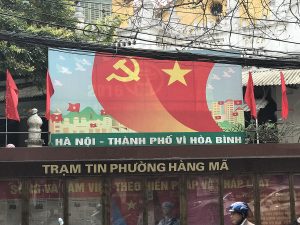Despite the best efforts of the Vietnamese authorities, the names of the country’s likely next top leaders have been leaked a week before the start of the 13th National Congress of the ruling Communist Party next week.
The quinquennial conclave, which runs from January 25 to February 2, will see the Vietnamese Communist Party (VCP) appoint its senior leaders for the upcoming five-year term.
The rumored personnel decisions were made during a plenum on January 16 and 17, and include appointments to the positions known as the “four pillars”: the VCP general secretary, state president, prime minister, and chairperson of the National Assembly.
The leaked list of candidates for the four positions have now circulated widely on social media and in other reports. According to the unverified reports, Nguyen Phu Trong is set to stay on as VCP General Secretary, while Prime Minister Nguyen Xuan Phuc will be shuffled over to the post of state president.
Meanwhile, Vuong Dinh Hue – a former deputy prime minister and currently party secretary of Hanoi – will become the new chairperson of the National Assembly. Pham Minh Chinh, currently the head of the VCP Central Commission of Personnel and Organisation, is set to be appointed prime minister.
Perhaps the most surprising of these announcements is the mooted reappointment of the 77-year-old General Secretary Trong. Rumors have swirled about Trong’s health after he reportedly suffered a stroke in April 2019, and at official state events he has often appeared frail and unwell. Trong has also already served the two terms allotted to him under Vietnam’s Constitution, meaning that the VCP Congress will have to push through a constitutional revision in order to confirm his reappointment as party chief. According some analysts, Trong was reappointed because the Party was unable to reach a consensus on who should succeed him, and could well step down part way through his third term if a suitable candidate is found.
These reported selections break with established norms in several other ways. The first relates to the government’s mandatory retirement age of 65. Age exemptions have occasionally been granted, especially in the case of the general secretary position, but there has never been more than one exemption granted. If these rumors are true, the upcoming Congress is likely to see two: one for Trong, and a second for Nguyen Xuan Phuc, who is 67 years of age.
It is also notable that none of the “four pillars” officials are from Vietnam’s south, violating an informal norm that the main candidates represent the two main regions. Pham Minh Chinh’s promotion to the prime minister position also breaks a norm that has been in place since 1986, by which the position is generally reserved for someone who has previously served as deputy prime minister.
What explains the violation of long-held norms? In a recent commentary, Le Hong Hiep of the ISEAS Yusof-Ishak Institute argued that it likely reflected the lack of consensus among party powerbrokers, and the fact that “they have made significant compromises with one another to make the seemingly impossible solutions possible.”
“The ultimate goal for them is to come up with a new leadership structure acceptable to all factions,” he added. “During this process, the institutionalization of the Party’s succession politics may temporarily take a back seat.”
None of these appointments have been confirmed, of course, and could well change between now and the official announcements at the National Congress. For their own part, the Vietnamese authorities have warned that anyone leaking or publishing “false or secret” information about personnel appointments stands to be punished under Vietnamese law.
Indeed, given the opacity of Vietnamese elite politics, and the unpredictable course of past Congresses, some surprises could still be in store.

































